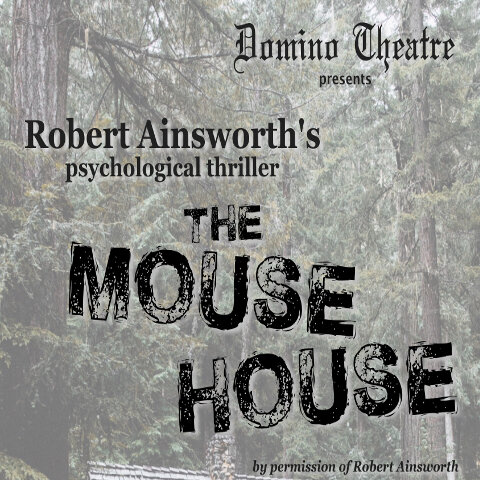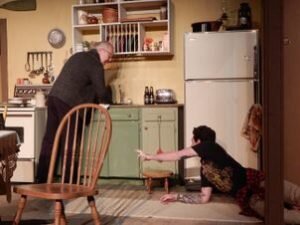In a turbulent and divisive time, The Mouse House reminds audiences that we must be kind and vulnerable with one another

Following the successful run of A Comedy of Tenors, Domino Theatre is back with the second instalment of their season: The Mouse House, a thrilling and timely play by Canadian playwright Robert Ainsworth. This 90-minute rollercoaster will have audiences sitting tensely in their seats, on edge for the next surprise, and hoping that none of the characters end up using the weapons that loom onstage for the play’s duration. Beyond the dramatics, though, The Mouse House tells a cautiously optimistic tale about what might happen if 2 strangers happen to exhibit vulnerability with one another, even if the circumstances of this union are peculiar.
Escaping to Skeleton Shores to focus on his book, a socially-awkward Carson (Richard Palimaka) walks in to a beautifully and meticulously designed cottage alongside his agent Bobby (Sandy Turcotte) in the first scene. See, Carson is a published author, but doesn’t seem to derive any well-earned pleasure from the fruits of his success. He’d rather take refuge in a remote family cabin to write in isolation than in a city populated by like-minded individuals. He does not even own a cellphone, and refuses to take Bobby’s for the duration of his stay at his cottage, despite her insistence. It becomes clear early on that Carson is a recluse, perhaps more comfortable alone than in the company of people. You can imagine how a person of this nature might react to a burglary.

In the middle of the night, Troy (Tom Abram) breaks into Carson’s cabin, only to be ambushed and knocked unconscious by Carson. The next morning, Troy wakes up in a bed with a gun pointed at his face. Thus begins an unlikely relationship with two even unlikelier parties, making for a truly rich night of drama and comedy. Both Palimaka and Abram deliver compelling performances as their respective characters. Abram captured the impulsiveness, aggressive and defensive nature of Troy, characteristics one would associate with a former juvenile delinquent, which he was. In the same regard, Palimaka achieved an understanding of what it means to be a gay introverted author who experienced his youth during the AIDS crisis, which he was. Yet, Palimaka could have been more dynamic in his emotional delivery at cathartic moments for his character, of which there were a few. Having done this would have made Carson’s character arc more impactful for audiences as he is the one that undergoes the most change throughout the show. Nevertheless, the performances were compelling enough to carry audiences all the way through the play, sympathizing with different characters at different points in the story, especially when the characters begin to let their guard down.
After a couple days of keeping Troy hostage, the audience wonders why Carson will not free him or call the police to arrest him. Then, it dawns on us – Carson wants companionship so much that he is willing to turn to a former convict for it. At first, Troy resists, using homophobic slurs towards Carson. Sooner or later, though, Troy also begins to open up, sharing private details about his past with a newfound confidant, something that Troy has also not had in a while. Under the effective direction of Morgan Mainguy, The Mouse House is a telling tale about how showing kindness and vulnerability to our fellow person can have a positive and substantial impact on one’s mental health, growth and self-realization. As John Mayer sings in “Wheel”, “I believe that my life’s gonna see / the love that I get / return to me”.
The Mouse House runs at the Domino Theatre from October 18 to November 3. Tickets are $20, and can be purchased through the Kingston Grand website.
